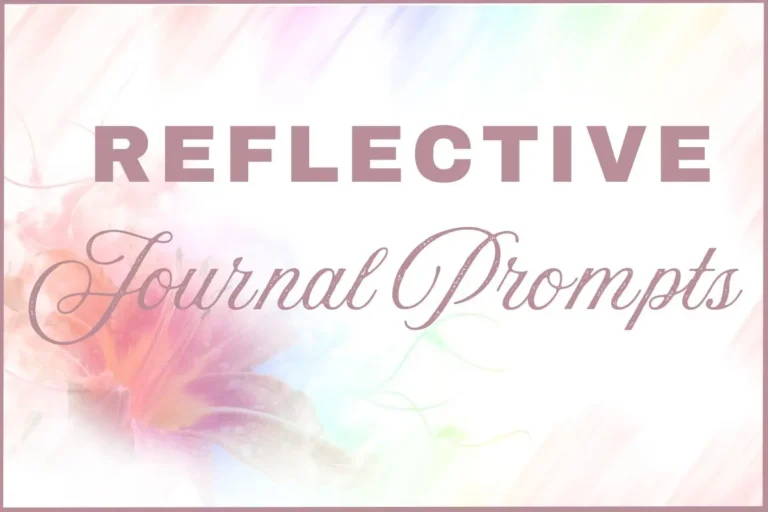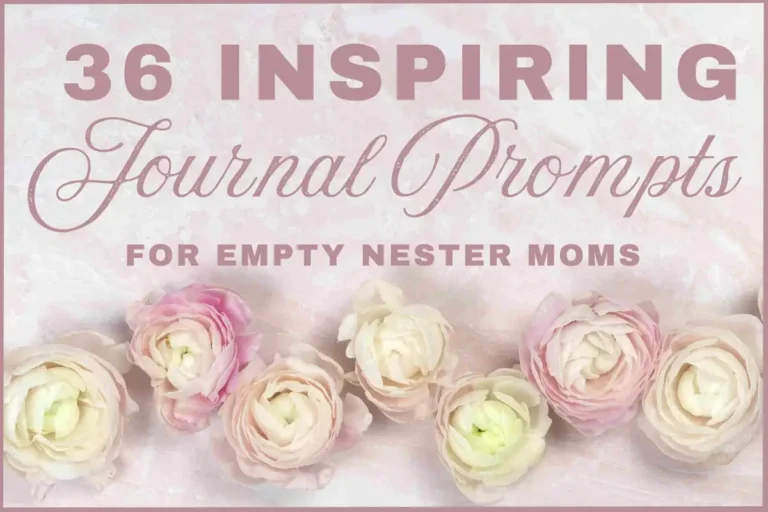Journaling Guide For Empty Nesters: From Loneliness To Self-Discovery
When the children leave home, the silence can feel deafening, the loneliness overwhelming. The routines that once anchored our days – school runs, shared meals, late-night talks – suddenly vanish, leaving behind a quiet void.
It’s natural to feel adrift during this time, as if you’re standing at a crossroads, unsure of which path to take.
But what if this quiet phase in life isn’t just empty space, but an open door to a new beginning?
Journaling offers a simple yet powerful way to turn this silence and loneliness into opportunities for self-discovery. It is one of the most powerful tools I’ve found for navigating this transition.

In this journaling guide for empty nesters, we take a closer look at how writing in a journal can help you reconnect with yourself, reclaim your purpose, and find peace in the journey ahead.
Understanding the Emotional Impact of an Empty Nest
Parenthood is one of life’s most immersive roles. As mothers, much of our identity is built around being present for our children. From carpool schedules to bedtime routines, every day is structured around caring for someone else. So, when the house empties out, it’s natural to feel a sense of loss.
Suddenly, the demands on our time shift. The packed calendar of school events and practices gives way to unstructured hours. This freedom can feel uncomfortable at first – like stepping into a room you’ve never entered before.
There’s no need to fill every moment, and yet, there is an undefinable sense of discomfort – as if you need to be doing something but are not sure what.
When life shifts suddenly, it’s normal to feel a whirlwind of emotions—grief for what’s changed, uncertainty about what’s next, and maybe even guilt for feeling overwhelmed when others expect you to embrace this new freedom.
Recognizing and honoring your feelings is the first step toward healing and self-discovery. It’s about giving yourself permission to feel everything without judgment.
This is where journaling for self-discovery comes in.
How Self-Discovery Journaling Helps You Recognize and Honor Your Feelings

Transitioning into an empty nest can leave you with a wave of emotions that feel chaotic or hard to untangle.
Journaling provides a safe outlet to release these feelings, giving them a place to exist outside of your mind. Think of it as unpacking a cluttered suitcase.
When you write, the jumble slowly begins to make sense – here’s how:
Helps Release Emotions: Writing down what you feel – whether it’s sadness, frustration, or even relief – can be cathartic. When you let those emotions flow onto the page, they stop lingering unspoken. Journaling helps lighten that emotional weight.
Helps Clarify Your Thoughts: Have you ever felt like your thoughts are racing or spinning in circles? Writing them out organizes the chaos into understandable patterns. This clarity often brings surprising insights.
Lowers Stress: Studies suggest that expressive writing can lower stress levels. Getting your worries out of your head and onto a page reduces the mental “clutter” that contributes to anxiety.
Journaling offers freedom.
There’s no judgment or interruption – just an open space to say exactly what you’re feeling.
Over time, this practice can help you handle complex emotions with a sense of clarity and calm.
But that’s not all. As you persevere, you’ll truly start to recognize the transformative benefits of journaling for empty nester moms.
Journal Prompts to Explore Your Feelings
Sometimes staring at a blank page feels intimidating. Prompts can guide your thoughts in productive directions. Here are a few to try:
- What about this phase of life excites me? What scares me?
- How has my identity changed since becoming an empty nester?
- What are three things I miss and why?
- What new opportunities might this transition offer?
- How do I want my life to feel over the next five years?
These 36 inspiring journal prompts for empty nester moms includes prompts in different categories so you can choose from one that’s most aligned with what you wish to achieve.
Reflecting on Your Journey So Far

Life has a way of rushing by, filled with responsibilities, obligations, and countless moments of joy and challenge. When was the last time you paused to reflect on the incredible journey you’ve already traveled?
It’s easy to forget how much you’ve accomplished and how resilient you’ve been when the demands of life pull you in so many directions.
Now, with a quieter home and more space for yourself, you have the opportunity to look back—not with judgment or regret, but with curiosity and appreciation.
Start by opening your journal and asking yourself: “What are some of the most defining moments in my life? How did they shape who I am today?”
These moments might include milestones like raising a family, navigating a career, overcoming challenges, or even the small, everyday triumphs that often go unnoticed.
Write freely, allowing memories to surface without worrying if they’re significant enough.
As you reflect, you may find a mix of emotions—pride for your achievements, tenderness for the struggles you’ve endured, or even a sense of loss for the dreams you had to set aside. Let all of these emotions have their space on the page. They’re part of your unique story and acknowledging them can be deeply healing.
Your story is rich and layered, filled with moments that have shaped the person you are today. By reflecting on it with compassion and curiosity, you can gain clarity about where you’ve been and where you want to go. Journaling becomes a bridge between your past and your future, guiding you toward the life you’re ready to create.
Discovering New Aspects of Yourself Through Writing

Parenting often leaves little room for personal exploration. Your needs, passions, and dreams may have taken a backseat to the daily routines of motherhood.
But now? The pages of your journal can become a mirror, reflecting parts of yourself you may have forgotten.
Uncovering Passions and Hobbies: What did you love before life became busy with kids? Writing can reignite interests that lay dormant—whether it’s painting, gardening, cooking, or learning a new skill.
Identifying Goals: Journaling helps you ask yourself questions that may not have crossed your mind in years. What do you want to achieve? Is there a vision for your future that excites you?
As you write, you’ll start to hear your voice again – the one that’s separate from the role of “Mom.” Your journal can guide you toward finding joy in new dreams, or reviving passions that have been waiting in the wings. Think of it as meeting yourself for the first time, all over again.
This process of self-discovery through writing doesn’t need to happen all at once. Each journal entry is a step toward embracing the next phase of your identity – a phase filled with curiosity, purpose, and self-appreciation.
Practical Journaling Techniques for Beginners

Starting a journaling practice can feel intimidating, especially if you’re staring at a blank page unsure of what to write.
But journaling for self-discovery isn’t about perfection – there’s no right or wrong approach. It’s simply about capturing your thoughts, emotions, and reflections in a way that helps you process the world around you and within you.
Here are a few techniques to make journaling approachable and rewarding.
Use Daily Prompts to Start Writing
Having a specific prompt to respond to can take away the guesswork and get the words flowing when you’re just starting.
Daily prompts can guide your focus, making it easier to connect with your thoughts and feelings without overthinking.
Try incorporating reflective journal prompts like these into your journaling routine:
- What are three things I’m grateful for today?
- What do I miss most today, and why?
- What’s something I’ve accomplished this week, no matter how small?
- If I bumped into my younger self, what advice would I give her?
- Describe a moment I felt truly at peace recently.
Having these questions ready works like a gentle nudge, encouraging you to explore your emotions and thoughts in the moment.
When used over time, these reflective journal prompts will become a starting point for deeper self-reflection.
Practice Stream of Consciousness Writing to Release Emotions
Stream of consciousness writing is one of the simplest and most freeing journaling techniques. All it requires is a pen, paper, and a willingness to let your thoughts spill onto the page – unedited and unfiltered.
Set a timer for 10-15 minutes, then simply write whatever comes to mind. Don’t pause to think, don’t worry about grammar, and don’t judge your thoughts. The goal here is not to create something polished but to release what’s bottled up inside you.
This method is particularly helpful when emotions feel tangled or overwhelming. Imagine your mind as a jar of sand and water – when shaken, it’s cloudy and hard to see through.
Stream of consciousness writing is like letting the jar settle so everything becomes clearer. You’ll likely find that once the time is up, your feelings seem a little less chaotic and more manageable.
Use Lists & Themes for Self-Reflection
If free writing feels daunting, consider using lists as an alternative journaling method.
Structured and straightforward, lists allow you to explore meaningful topics without the pressure of crafting complete sentences or paragraphs.
You might choose a specific theme for each list, such as:
My Strengths: What skills or traits do I have that I’m proud of?
Things That Bring Me Joy: From simple pleasures like a warm cup of tea to big moments of happiness, list them out.
Dreams and Goals: What would make me excited to wake up in the morning?
Themes help focus your thoughts and turn your journal into a treasure trove of self-discovery.
Plus, reviewing these lists later can serve as a powerful reminder of your resilience, passions, and purpose during times of doubt or loneliness.
Reflective Writing Practices
Free writing is a simple yet powerful technique. Spend 10 minutes writing nonstop about whatever comes to mind. Don’t worry about grammar or structure—just let your thoughts spill out.
Gratitude journaling is another effective option. Each day, jot down three things you’re grateful for. This practice shifts your focus from what’s missing to what’s present, creating a more positive mindset.
Building a Routine to Make Journaling a Habit
Journaling is not just an emotional outlet; it’s a gift you give yourself daily. Like any meaningful gift, turning it into a habit requires intention and consistency. The key? Starting small, finding your rhythm, and making it feel like a natural part of your day.
Here are some ideas on how you can create an enjoyable journaling routine tailored just for you.
Find the Right Time and Space to Write: Creating a regular space and time for journaling is like building a soft nest for your thoughts. A comfortable environment makes the experience inviting, while consistency builds the habit.
Choose a Time That Works for You: Are you an early riser? Mornings might be your best chance to write with a clear mind. Prefer quiet evenings? End your day by reflecting with your journal. The time isn’t as important as making it consistent, so choose a point in your day where you naturally feel calm and focused.
Design a Dedicated Writing Space: Think of a space in your home where you feel relaxed—whether it’s a quiet corner, by a sunny window, or even your favorite chair. Set this spot aside for journaling, and consider adding personal touches like a cozy blanket, a candle, or your favorite cup of tea to make it special.
Integrate Journaling with Existing Routines: Pairing your writing with something you already do each day (like drinking your morning coffee or winding down before bed) makes it easier to follow through. For example, you might keep your journal next to your coffee maker as a gentle reminder.
Consistency isn’t about perfection; it’s about showing up for yourself. Even just five minutes a day in a comforting setting can unlock a calming, memorable rhythm for your writing practice.
Tips for Overcoming Common Obstacles to Consistency

Let’s face it: Anything worth doing has its hurdles, and journaling is no exception. You might feel too busy, unsure what to write, or even intimidated by the blank page. The good news? There’s always a way to move past these barriers. Here’s how you can keep journaling consistent, no matter what stands in your way.
If You Feel Too Busy: Think there’s no time to journal? Start with just 5 minutes a day. Set a timer, put pen to paper, and write freely for those few minutes. Short sessions are better than none and can still pack emotional benefits.
And remember, journaling doesn’t always mean long paragraphs—it could be a quick list or even a few words about how you’re feeling.
If You Face Writer’s Block: Don’t know where to start? Use journal prompts to get the ball rolling. Simple questions like, “What made me smile today?” or “What’s one thing I’m proud of this week?” can make the process feel effortless. This is your journal—there’s no right or wrong way to fill it.
If You Struggle with Motivation: It’s easy to lose steam, especially if journaling feels forced. On tougher days, remind yourself that this is a gift for you. Don’t strive for perfect entries—raw emotional honesty is far more valuable. Celebrate small wins, like filling just one page or noting one meaningful thought.
Building a habit takes patience, and challenges are a natural part of the process. Treat journaling as a compassionate experience, not another task on your to-do list. Little by little, consistency will feel less like a chore and more like self-care.
By creating a supportive environment, committing to small, actionable steps, and being kind to yourself when obstacles arise, journaling transforms into a practice you look forward to—a sacred space to explore, reflect, and grow.
Turning Self-Discovery into Action
Journaling can open the door to profound self-awareness, especially during major life transitions like becoming an empty nester. But understanding yourself is only the first step – it’s what you do with these insights that creates meaningful change.
By identifying patterns, desires, and goals through writing, you gain a roadmap for action.
Here’s how you can take these reflections and turn them into tangible steps.
Explore Hobbies and Interests That Resonate
Journaling has a way of bringing forgotten passions back into focus. Maybe you’ve written about childhood interests you set aside or new activities you’ve always wanted to try. Think of these entries as clues for exploring what makes you feel alive.
Think of your journal like a brainstorming session where no idea is off-limits.
Did you notice that you often doodle in the margins? Perhaps painting or drawing feels natural to you.
Have you written about your love for cooking favorite meals? Maybe experimenting with new recipes or taking a culinary class could spark joy.
Here are a few simple ways to act on insights from journaling:
Revisit Old Hobbies: Think about what used to make time fly when you were younger. Did you enjoy gardening, sewing, or reading novels? Allow yourself the space to revisit these favorite pastimes.
Try Something New: Your journal might reveal recent interests you haven’t explored, like yoga, photography, or writing poetry. Take a class, watch tutorials, or find local groups to dive in.
Set Small Goals: If something feels intimidating to start, break it into smaller steps. Want to learn how to play the piano? Begin with one song or 15 minutes of practice a day.
By nurturing these moments of discovery, you shift your focus from loss to growth. Hobbies give you a sense of purpose while offering something uniquely your own. It’s not about perfection; it’s about finding joy in the process.
Rebuild Connections & Finding Community
Loneliness often feels heavier when we’re disconnected from others. Journaling can help you process these emotions but also it also encourages you to take steps to rebuild a social network.
Don’t forget: You’re not alone. There are many other empty nesters that are eager to connect – you just need to take the first step.
Rediscovering community is pivotal for reducing isolation and enriching your life. Whether it’s rekindling past friendships or making new ones, action begins with small, intentional choices.
Here are actionable ways to regain connection:
Reach Out to Old Friends: Sometimes, a simple text or call is all it takes to bridge the gap. Start by reaching out to someone whose friendship you’ve always valued.
Join Clubs or Social Groups: Think about interests you’ve identified through journaling—like book clubs, fitness classes, or art workshops. These shared spaces are excellent for meeting like-minded people.
Volunteer Locally: Helping others is a meaningful way to build relationships. Consider volunteering at local charities, libraries, or shelters where your time and care will be appreciated.
Attend Events or Classes: From community fairs to creative workshops, attending events can help you find connections in an organic way.
Reconnecting doesn’t require grand gestures. Small efforts, like a coffee date or participating in a local art class, can lead to meaningful relationships.
Remember, building a supportive network takes time, so be patient and open to possibilities.
By channeling your journaling discoveries, you’re not just filling time—you’re building new dimensions of your life. These steps invite growth and connection, allowing loneliness to fade as you embrace what’s next.
Loneliness after the kids leave home isn’t the end of your story – think of it as the beginning to a new chapter.
Through journaling, you can turn quiet moments into meaningful self-reflection, uncovering who you are beyond the role of “Mom.” Each page you fill becomes a step toward rediscovering your passions, embracing personal growth, and finding purpose in this new chapter.
Take that first step today.
Grab a notebook, find a calm space, and let your thoughts flow. This journey is yours to shape, and it starts with just one word.







